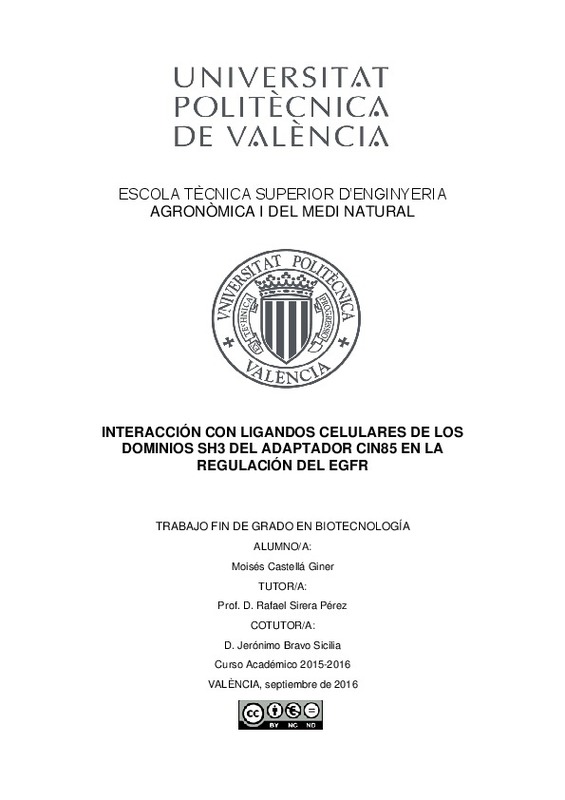

Listar por palabra clave "EGFR"
RiuNet: Repositorio Institucional de la Universidad Politécnica de Valencia
- RiuNet repositorio UPV
- :
- Listar por palabra clave
JavaScript is disabled for your browser. Some features of this site may not work without it.
Buscar en RiuNet
Listar
Mi cuenta
Ayuda RiuNet
Admin. UPV
Listar por palabra clave "EGFR"
Mostrando ítems 1-5 de 5
-
González Rodríguez, Patricia (Universitat Politècnica de València, 2015-06-17)[EN] Mutations in KRAS have been associated with resistance to anti-EGFR drugs and with a worse prognosis in colorectal cancer (CRC). KRAS membrane is a GTPase that transduce the extracellular signal from the cytoplasms ...
-
Bover, Isabel; Rolfo, Christian; Jantus Lewintre, Eloisa; Sirera Pérez, Rafael; Camps, Carlos; Chaib, Imane; Ramirez-Serrano, Jose L.; Benlloch, Susana; Molina-Vila, Miguel Angel; Simonetti, Sara; Costa, Carlota; Gimenez-Capitan, Ana; Mendez, Pedro; Taron, Miguel; Rosell, Rafael (Elsevier, 2011-12)The majority of non-small-cell lung cancer (NSCLC) patients present with locally advanced (35%) or metastatic disease (40%); in this setting, it is of the utmost importance to balance efficacy with toxicity. However, with ...
-
Castellá Giner, Moisés (Universitat Politècnica de València, 2016-09-29)[ES] Relevancia del EGFR El receptor del Factor de crecimiento epidérmico (EGFR) es un receptor del tipo tirosina quinasa (RTK). La interacción con su ligando natural (el Factor de crecimiento epidérmico, EGF) es la ...
-
Iranzo, Vega; Sirera Pérez, Rafael; Carrato, Alfredo; Cabrera, Andrea; Jantus, Eloísa; Guijarro, Ricardo; Sanmartín, Elena; Blasco, Ana; Gil, Mireia; Gómez Aldaraví, Lorenzo; González Larriba, José Luis; Massuti, Bertomeu; Velasco, Amalia; Provencio, Mariano; Rosell, Rafael; Camps, Carlos (Springer, 2011-06)[EN] Background: In advanced-stage (IIIB or IV) non-small-cell lung cancer (NSCLC), combination chemotherapy has demonstrated response rates of 20% and a 1-year survival rate of 30%. We conducted a multicentre, open-label, ...
-
Malapelle, Umberto; Sirera Pérez, Rafael; Jantus-Lewintre, Eloisa; Reclusa, P.; Calabuig-Farinas, S.; Blasco, Ana; Pisapia, P.; Rolfo, C.; Camps, Carlos (Taylor & Francis, 2017)[EN] Introduction: The discovery of driver mutations in non-small cell lung cancer (NSCLC) has led to the development of genome-based personalized medicine. Fifteen to 20% of adenocarcinomas harbor an epidermal growth ...
Mostrando ítems 1-5 de 5

Universitat Politècnica de València. Unidad de Documentación Científica de la Biblioteca (+34) 96 387 70 85 · RiuNet@bib.upv.es




